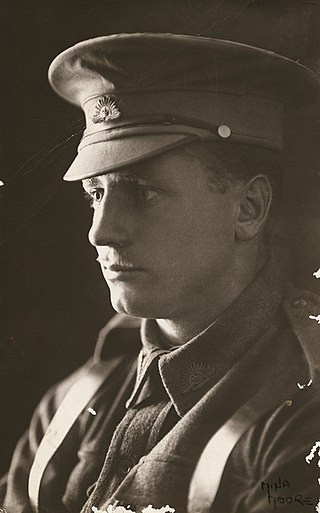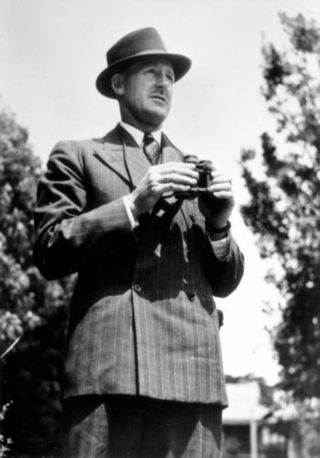The Rt Rev Percival William Stephenson was the 6th Anglican bishop of Nelson [1] whose episcopate spanned a 14-year period in the mid-20th century.
The son of Arthur Henry Stephenson (1867-1955), [2] and Annie Amelia Vevers Stephenson (1865-1903), née Brailey, [3] Percival William Stephenson was born at Malmsbury, Victoria on 5 May 1888.
He married Grace Ermyntrude Lavender (1885-1974) on 9 October 1913. [4] [5] They three children, Millicent Lavender Stephenson (1914-), [6] Arthur Lavender Stephenson (1917-2001), [7] and Noel Lavender Stephenson (1920-). Percival Stephenson died in 1962.
He was educated at Caulfield Grammar School, Melbourne, [8] where he was an outstanding footballer in the school's First XVIII, [9] the University of Melbourne, the Australian College of Theology, and the University of London.
He was ordained in 1914. [10]
He moved to India to teach at CMS Edwards College in Peshawar, where he was initially a teacher and then principal (1921–1924). From 1924 to 1928 he was professor of exegetical theology at St John's College, Winnipeg. [11]
On his return to Australia he became federal secretary of the Church Missionary Society of Australia and Tasmania and headmaster of Trinity Grammar School, Sydney (1935–37) [12] and then commonwealth secretary of the British and Foreign Bible Society until his elevation to the episcopate in 1940.
He died on 29 May 1962. [13]

Sir John Clifford Valentine Behan, the first Rhodes Scholar from the state of Victoria, was an Australian educationalist and lawyer, the second warden of Trinity College at the University of Melbourne, and "beyond the college life [at Trinity,] he was a sound and far-seeing secretary in Australia of the Rhodes Scholarship Trust for 30 years from 1922 to 1952".
Trevor Ashmore Pyman was an Australian diplomat.

Sir James Alexander Forrest was an Australian lawyer, businessman and philanthropist.

Wilbur Norman "Chris" Christiansen was a pioneer Australian radio astronomer and electrical engineer.

Richard Cameron Wardill was an Australian rules footballer and coach who played for the Melbourne Football Club in the Victorian Football League (VFL).

Francis Ernest Langley was an Australian rules footballer who played for the Melbourne Football Club in the Victorian Football League (VFL) during the early 1900s.
Hugh Julian Boyd was a dental surgeon, and a former Australian rules footballer who played with University in the Victorian Football League (VFL). He served in the First AIF, and was awarded a Military Cross in 1917.

Richard Horace Maconochie Gibbs, a medical student and an Australian rules footballer, played with the Melbourne University Football Club in the Victorian Football League.
John Ware Robinson was an Australian rules footballer who played with University in the Victorian Football League (VFL). He served in the First AIF, and was awarded a Distinguished Conduct Medal in 1917.

Arthur Bruce Pie was an Australian politician who served in the Legislative Assembly of Queensland.
Alfred Joseph Watson was an Australian track and field athlete who competed in the 1928 Summer Olympics and in the 1936 Summer Olympics.

Gordon Clunes Mackay Mathison FRCP was a physician, medical researcher, and soldier.

John William Twycross was an Australian Pictorialist photographer. His main body of work was produced between 1918 and 1932; and his photographs documented rural scenes, seascapes, working life, and architecture around Port Phillip Bay, and Melbourne.
Claude Terrell Crowl was an Australian rules footballer who played with St Kilda in the Victorian Football League.
Austin Burton Edwards was an Australian geologist, winner of the Clarke Medal in 1960.
Henry Thomas Langley was the Anglican Dean of Melbourne from 1942 to 1947.
Herbert Marcus Glasscock was an Australian rules footballer who played with Melbourne in the Victorian Football League (VFL).
John William "Mick" McLaren was an Australian rules footballer for the St Kilda Football Club in the Victorian Football League (VFL), who later became the manager of a highly successful printing business.
William Matthew O'Halloran was an Australian cricketer. He played six first-class cricket matches for Victoria between 1962 and 1964.

Hugh Gemmell Lamb-Smith, known as Gemmell, was an innovative Australian educator who landed at Anzac Cove, Gallipoli, on Sunday, 25 April 1915 as a member of the Second Field Ambulance unit, and went on to serve in Europe for the duration of the war. He also served as an AIF Education Scheme Instructor in Belgium. He was a prominent (lay) member of the Melbourne Anglican community, and he taught at Caulfield Grammar School from 1913 to 1951.